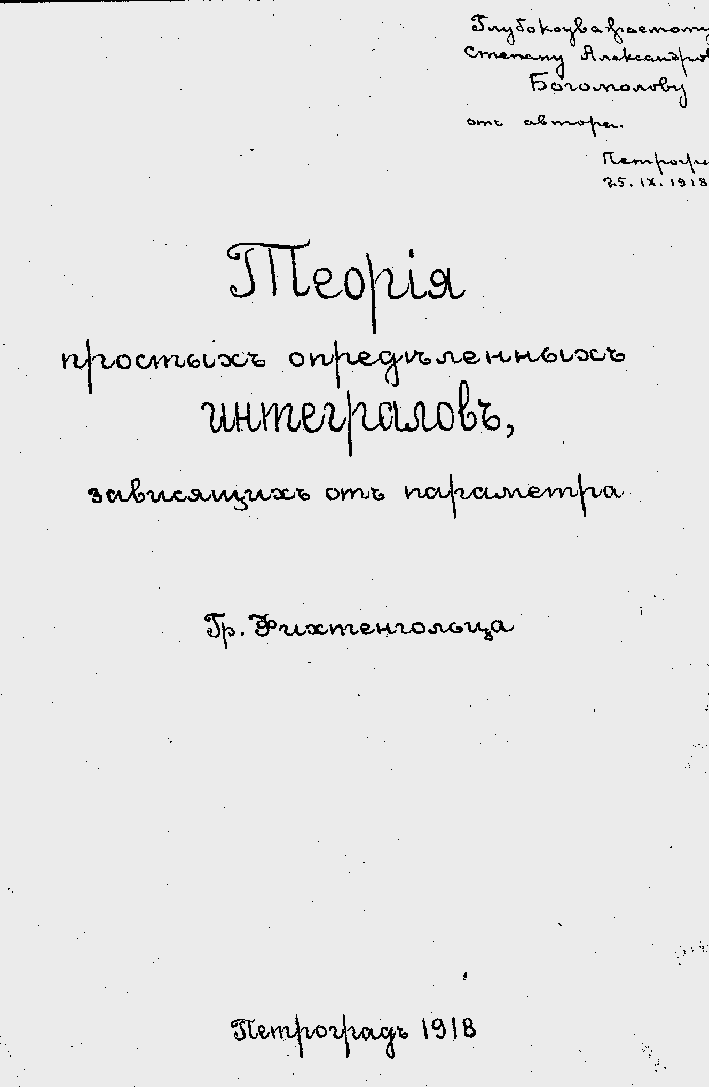


Fikhtengol'ts founded the Leningrad school
of the theory of functions of real variables. The history of this school
goes back to his Master thesis on the theory of integral (1918). A series
of papers on the metrical theory of functions made him one of the leading
mathematicians working in this area. Fr.Riesz, D. Vitali, Ch. La Vallee
Poussin were among his foreign correspondents during that years.
A joint work of Fikhtengol'ts and L.V.Kantorovich
initiated in 1934 the research of the Leningrad school on the functional
analysis. At that time Fikhtengol'ts published several papers which were
notable by an unusual (for that time) setting of the problem. Namely, he
studied functionals which were continuous with respect to the essentially
nonmetric convergence. Further development of the functional analysis confirmed
the importance of such research.
The seminar on functional analysis headed
by Fikhtengol'ts and L.V.Kantorovich worked at the University for many
years and played the role of the center of Leningrad research in
functional analysis.
 Fikhtengol'ts
liked all forms of pedagogical activities and tried to devote the most
part of his forces to teaching. He was one of the organizers of the Pedagogical
Institute. He worked much with schoolchildren, gave them lectures. In the1930s
he headed the work on school syllabuses. It was Fikhtengol'ts who initiated,
in 1934, the first mathematical olympiad in the USSR. Fikhtengol'ts is
most famous for his course of analysis that he gave at the University for
more than thirty years. The books based on this course are well known all
over the world. The three-volume treatise A Course of Differential and
Integral Calculus is an excellent encyclopedia of the mathematical
analysis. But however good are these books, they do not give a complete
idea of their author's pedagogical skill. It will not be an exaggeration
to say that each of his lectures, for students, schoolchildren or teachers,
was a pedagogical masterpiece. By the end of his lecture, even the blackboard
looked like a piece of art.
Fikhtengol'ts
liked all forms of pedagogical activities and tried to devote the most
part of his forces to teaching. He was one of the organizers of the Pedagogical
Institute. He worked much with schoolchildren, gave them lectures. In the1930s
he headed the work on school syllabuses. It was Fikhtengol'ts who initiated,
in 1934, the first mathematical olympiad in the USSR. Fikhtengol'ts is
most famous for his course of analysis that he gave at the University for
more than thirty years. The books based on this course are well known all
over the world. The three-volume treatise A Course of Differential and
Integral Calculus is an excellent encyclopedia of the mathematical
analysis. But however good are these books, they do not give a complete
idea of their author's pedagogical skill. It will not be an exaggeration
to say that each of his lectures, for students, schoolchildren or teachers,
was a pedagogical masterpiece. By the end of his lecture, even the blackboard
looked like a piece of art.
Brilliant lectures of Fikhtengol'ts concealed a lot
of work. After forty years of teaching he still spent many hours on preparing
his lectures, on thinking over each word. He had the same attitude to examinations.
Fikhtengol'ts was an excellent examiner, both severe and friendly. He listened
intently to a student, without missing a word, however incoherent and confused
was the answer. Extraordinary conscientiousness, efficiency and a sense
of responsibility complemented his talent and were his most characteristic
features.